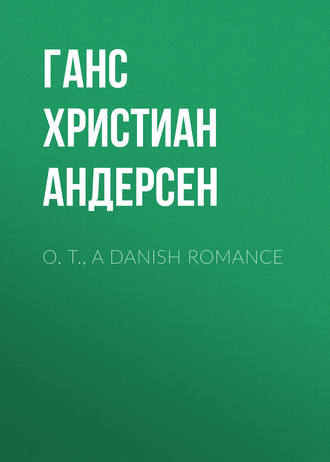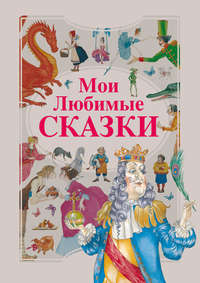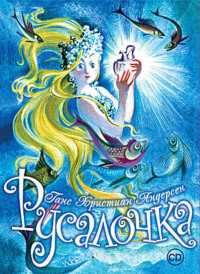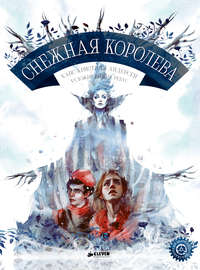 полная версия
полная версияO. T., A Danish Romance
“Is she your only sister?” inquired Otto.
“No,” returned Wilhelm, “I have two—the other is named Louise; she is of quite an opposite character: I do not know of which one ought to think most. Have you no brothers or sisters?” he asked of Otto.
“No!” returned the latter, with his former involuntary, half-melancholy expression. “I am an only child. In my house it is solitary and silent. My grandfather alone is left alive. He is an active, strong man, but very grave. He instructed me in mathematics, which he thoroughly understands. The preacher taught me Latin, Greek, and history: two persons, however, occupied themselves with my religious education—the preacher and my old Rosalie. She is a good soul. How often have I teased her, been petulant, and almost angry with her! She thought so much of me, she was both mother and sister to me, and instructed me in religion as well as the preacher, although she is a Catholic. Since my father’s childhood she has been a sort of governante in the house. You should have seen her melancholy smile when she heard my geography lesson, and we read of her dear Switzerland, where she was born, and of the south of France, where she had travelled as a child. The west coast of Jutland may also appear very barren in comparison with these countries!”
“She might have made you a Catholic! But surely nothing of this still clings to you?”
“Rosalie was a prudent old creature; Luther himself need not have been ashamed of her doctrine. Whatever is holy to the heart of man, remains also holy in every religion!”
“But then, to erect altars to the Madonna!” exclaimed Wilhelm; “to pray to a being; whom the Bible does not make a saint!—that is rather too much. And their tricks with burning of incense and ringing of bells! Yes, indeed, it would give me no little pleasure to cut off the heads of the Pope and of the whole clerical body! To purchase indulgence!—Those must, indeed, be curious people who can place thorough faith in such things! I will never once take off my hat before the Madonna!”
“But that will I do, and in my heart bow myself before her!” answered Otto, gravely.
“Did I not think so? she has made you a Catholic!”
“No such thing! I am as good a Protestant as you yourself: but wherefore should we not respect the mother of Christ? With regard to the ceremonials of Catholicism, indulgence, and all these additions of the priesthood, I agree with you in wishing to strike off the heads of all who, in such a manner, degrade God and the human understanding. But in many respects we are unjust: we so easily forget the first and greatest commandment, ‘Love thy neighbor as thyself!’ We are not tolerant. Among our festivals we have still one for the Three Kings—it is yet celebrated by the common people; but what have these three kings done? They knelt before the manger in which Christ lay, and on this account we honor them. On the contrary, the mother of God has no festival-day; nay, the multitude even smile at her name! If you will only quietly listen to my simple argument, we shall soon agree. You will take off your hat and bow before the Madonna. Only two things are to be considered—either Christ was entirely human, or He was, as the Bible teaches us, a divine being. I will now admit the latter. He is God Himself, who in some inexplicable manner, is born to us of the Virgin Mary. She must therefore be the purest, the most perfect feminine being, since God found her worthy to bring into the world the Son, the only one; through this she becomes as holy as any human being can, and low we must bow ourselves before the pure, the exalted one. Take it for granted that Christ was human, like ourselves, otherwise He cannot, according to my belief, call upon us to imitate Him; neither would it be great, as God, to meet a corporeal death, from which He could remove each pain. Were He only a man, born of Mary, we must doubly admire Him; we must bow in the dust before His mighty spirit, His enlightening and consoling doctrine. But can we then forget how much the mother has must have influenced the child, how sublime and profound the soul must have been which spoke to His heart? We must reverence and honor her! Everywhere in the Scriptures where she appears we see an example of care and love; with her whole soul she adheres to her Son. Think how uneasy she became, and sought for Him in the temple—think of her gentle reproaches! The words of the Son always sounded harsh in my ears. ‘Those are the powerful expressions of the East!’ said my old preacher. The Saviour was severe, severe as He must be! Already there seemed to me severity in His words! She was completely the mother; she was it then, even as when she wept at Golgotha. Honor and reverence she deserves from us!”
“These she also receives!” returned Wilhelm; and striking him upon the shoulder he added, with a smile, “you are, according to the Roman Catholic manner, near exalting the mother above the Son! Old Rosalie has made a proselyte; after all, you are half a Catholic!”
“That am I not!” answered Otto, “and that will I not be!”
“See! the thunder-cloud advances!”
resounded below in the court: the sweet Neapolitan song reached the ears of the friends. They stepped into the adjoining room and opened the window. Three poor boys stood below in the wind and rain, and commenced the song. The tallest was, perhaps, fourteen or fifteen years old, his deep, rough voice seemed to have attained its strength and depth more through rain and bad weather than through age. The dirty wet clothes hung in rags about his body; the shoes upon the wet feet, and the hat held together with white threads, were articles of luxury. The other two boys had neither hat nor shoes, but their clothes were whole and clean. The youngest appeared six or seven years old; his silvery white hair formed a contrast with his brown face, his dark eyes and long brown eyelashes. His voice sounded like the voice of a little girl, as fine and soft, beside the voices of the others, as the breeze of an autumnal evening beside that of rude November weather.
“That is a handsome boy!” exclaimed the two friends at the same time.
“And a lovely melody!” added Otto.
“Yes, but they sing falsely!” answered Wilhelm: “one sings half a tone too low, the other half a tone too high!”
“Now, thank God that I cannot hear that!” said Otto. “It sounds sweetly, and the little one might become a singer. Poor child!” added he gravely: “bare feet, wet to the very skin; and then the elder one will certainly lead him to brandy drinking! Within a month, perhaps, the voice will be gone! Then is the nightingale dead!” He quickly threw down some skillings, wrapped in paper.
“Come up!” cried Wilhelm, and beckoned. The eldest of the boys flew up like an arrow; Wilhelm, however, said it was the youngest who was meant. The others remained standing before the door; the youngest stepped in.
“Whose son art thou?” asked Wilhelm. The boy was silent, and cast down his eyes in an embarrassed manner. “Now, don’t be bashful! Thou art of a good family—that one can see from thy appearance! Art not thou thy mother’s son? I will give thee stockings and—the deuce! here is a pair of boots which are too small for me; if thou dost not get drowned in them they shall be thy property: but now thou must sing.” And he seated himself at the piano-forte and struck the keys. “Now, where art thou?” he cried, rather displeased. The little one gazed upon the ground.
“How! dost thou weep; or is it the rain which hangs in thy black eyelashes?” said Otto, and raised his head: “we only wish to do thee a kindness. There—thou hast another skilling from me.”
The little one still remained somewhat laconic. All that they learned was that he was named Jonas, and that his grandmother thought so much of him.
“Here thou hast the stockings!” said Wilhelm; “and see here! a coat with a velvet collar, a much-to-be-prized keepsake! The boots! Thou canst certainly stick both legs into one boot! See! that is as good as having two pairs to change about with! Let us see!”
The boy’s eyes sparkled with joy; the boots he drew on, the stockings went into his pocket, and the bundle he took under his arm.
“But thou must sing us a little song!” said Wilhelm, and the little one commenced the old song out of the “Woman-hater,” “Cupid never can be trusted!”
The lively expression in the dark eyes, the boy himself in his wet, wretched clothes and big boots, with the bundle under his arm; nay, the whole had something so characteristic in it, that had it been painted, and had the painter called the picture “Cupid on his Wanderings,” every one would have found the little god strikingly excellent, although he were not blind.
“Something might be made of the boy and of his voice!” said Wilhelm, when little Jonas, in a joyous mood, had left the house with the other lads.
“The poor child!” sighed Otto. “I have fairly lost my good spirits through all this. It seizes upon me so strangely when I see misery and genius mated. Once there came to our estate in Jutland a man who played the Pandean-pipes, and at the same time beat the drum and cymbals: near him stood a little girl, and struck the triangle. I was forced to weep over this spectacle; without understanding how it was, I felt the misery of the poor child. I was myself yet a mere boy.”
“He looked so comic in the big boots that I became quite merry, and not grave,” said Wilhelm. “Nevertheless what a pity it is that such gentle blood, which at the first glance one perceives he is, that such a pretty child should become a rude fellow, and his beautiful voice change into a howl, like that with which the other tall Laban saluted us. Who knows whether little Jonas might not become the first singer on the Danish stage? Yes, if he received education of mind and voice, who knows? I could really have, pleasure in attempting it, and help every one on in the world, before I myself am rightly in the way!”
“If he is born to a beggar’s estate,” said Otto, “let him as beggar live and die, and learn nothing higher. That is better, that is more to be desired!”
Wilhelm seated himself at the piano-forte, and played some of his own compositions. “That is difficult,” said he; “every one cannot play that.”
“The simpler the sweeter!” replied Otto.
“You must not speak about music!” returned the friend “upon that you know not how to pass judgment. Light Italian operas are not difficult to write.”
In the evening the friends separated. Whilst Otto took his hat, there was a low knock at the door. Wilhelm opened it. Without stood a poor old woman, with pale sharp features; by the hand she led a little boy—it was Jonas: thus then it was a visit from him and his grandmother.
The other boys had sold the boots and shoes which had been given him. They ought to have a share, they maintained. This atrocious injustice had induced the old grandmother to go immediately with little Jonas to the two good gentlemen, and relate how little the poor lad had received of flint which they had assigned to him alone.
Wilhelm spoke of the boy’s sweet voice, and thought that by might make his fortune at the theatre; but then he ought not now to be left running about with bare feet in the wind and rain.
“But by this means he brings a skilling home,” said the old woman. “That’s what his father and mother look to, and the skilling they can always employ. Nevertheless she had herself already thought of bringing him out at the theatre,—but that was to have been in dancing, for they got shoes and stockings to dance in, and with these they might also run home; and that would be an advantage.”
“I will teach the boy music!” said Wilhelm; “he can come to me sometimes.”
“And then he will, perhaps, get a little cast-off clothing, good sir,” said the grandmother; “a shirt, or a waistcoat, just as it happens?”
“Become a tailor, or shoemaker,” said Otto, gravely, and laid his hand upon the boy’s head.
“He shall be a genius!” said Wilhelm.
CHAPTER IV
“Christmas-tide,When in the wood the snow shines bright.”OEHLENSCHLÄGER’S HelgeWe again let several weeks pass by; it was Christmas Eve, which brings us the beautiful Christmas festival. We find the two friends taking a walk.
Describe to an inhabitant of the south a country where the earth appears covered with the purest Carrara marble, where the tree twigs resemble white branches of coral sprinkled with diamonds, and above a sky as blue as that belonging to the south, and he will say that is a fairy land. Couldst thou suddenly remove him from his dark cypresses and olive-trees to the north, where the fresh snow lies upon the earth, where the white hoar-frost has powdered the trees over, and the sun shines down from the blue heaven, then would he recognize the description and call the north a fairy land.
This was the splendor which the friends admired. The large trees upon the fortification-walls appeared crystallized when seen against the blue sky. The Sound was not yet frozen over; vessels, illuminated by the red evening sun, glided past with spread sails. The Swedish coast seemed to have approached nearer; one might see individual houses in Landskrona. It was lovely, and on this account there were many promenaders upon the walls and the Langelinie.
“Sweden seems so near that one might swim over to it!” said Wilhelm.
“The distance would be too far,” answered Otto; “but I should love to plunge among the deep blue waters yonder.”
“How refreshing it is,” said Wilhelm, “when the water plays about one’s cheeks! Whilst I was at home, I always swam in the Great Belt. Yes, you are certainly half a fish when you come into the water.”
“I!” repeated Otto, and was silent; but immediately added, with a kind of embarrassment which was at other times quite foreign to him, and from which one might infer how unpleasant confessing any imperfection was to him, “I do not swim.”
“That must be learned in summer!” said Wilhelm.
“There is so much to learn,” answered Otto; “swimming will certainly be the last thing.” He now suddenly turned toward the fortress, and stood still. “Only see how melancholy and quiet!” said he, and led the conversation again to the surrounding scenery. “The sentinel before the prison paces so quietly up and down, the sun shines upon his bayonet! How this reminds me of a sweet little poem of Heine’s; it is just as though he described this fortress and this soldier, but in the warmth of summer: one sees the picture livingly before one, as here; the weapon glances in the sun, and the part ends so touchingly,—‘Ich wollt’, er schösse mich todt!’ It is here so romantically beautiful! on the right the animated promenade, and the view over the Sund; on the left, the desolate square, where the military criminals are shot, and close upon it the prison with its beam-fence. The sun scarcely shines through those windows. Yet, without doubt, the prisoner can see us walking here upon the wall.”
“And envy our golden freedom!” said Wilhelm.
“Perhaps he derides it,” answered Otto. “He is confined to his chamber and the small courts behind the beam-lattice; we are confined to the coast; we cannot fly forth with the ships into the mighty, glorious world. We are also fastened with a chain, only ours is somewhat longer than that of the prisoner. But we will not think of this; let us go down to where the beautiful ladies are walking.”
“To see and to be seen,” cried Wilhelm. “‘Spectatum veniunt; veniunt spectentur ut ipsae,’ as Ovid says.”
The friends quitted the wall.
“There comes my scholar, little Jonas!” cried Wilhelm. “The boy was better dressed than at his last appearance; quickly he pulled his little cap off and stood still: a young girl in a wretched garb held him by the hand.
“Good day, my clever lad!” said Wilhelm, and his glance rested on the girl: she was of a singularly elegant form; had she only carried herself better she would have been a perfect beauty. It was Psyche herself who stood beside Cupid. She smiled in a friendly manner; the little lad had certainly told her who the gentlemen were; but she became crimson, and cast down her eyes when Wilhelm looked back after her: he beckoned to Jonas, who immediately came to him. The girl was his sister, he said, and was called Eva. Wilhelm nodded to her, and the friends went on.
“That was a beautiful girl!” said Wilhelm, and looked back once more. “A rosebud that one could kiss until it became a full blown rose!”
“During the experiment the rosebud might easily be broken!” answered Otto; “at least such is the case with the real flower. But do not look back again, that is a sin!”
“Sin?” repeated Wilhelm; “no, then it is a very innocent sin! Believe me, it flatters the little creature that we should admire her beauty. I can well imagine how enchanting a loving look from a rich young gentleman may be for a weak, feminine mind. The sweet words which one can say are as poison which enters the blood. I have still a clear conscience. Not ONE innocent soul have I poisoned!”
“And yet you are rich and young enough to do so,” returned Otto, not without bitterness. “Our friends precede us with a good example: here come some of our own age; they are acquainted with the roses!”
“Good evening, thou good fellow!” was the greeting Wilhelm received from three or four of the young men.
“Are you on Thou-terms with all these?” inquired Otto.
“Yes,” answered Wilhelm; “we became so at a carouse. There all drank the Thou-brotherhood. I could not draw myself back. At other times I do not willingly give my ‘thou’ to any but my nearest friends. Thou has something to my mind affectionate and holy. Many people fling it to the first person with whom they drink a glass. At the carouse I could not say no.”
“And wherefore not?” returned Otto; “that would never have troubled me.”
The friends now wandered on, arm-in-arm. Later in the evening we again meet with them together, and that at the house of a noble family, whose name and rank are to be found in the “Danish Court Calendar;” on which account it would be wanting in delicacy to mention the same, even in a story the events of which lie so near our hearts.
Large companies are most wearisome. In these there are two kinds of rank. Either you are riveted to a card-table, or placed against the wall where you must stand with your hat in your hand, or, later in the evening, with it at your feet, nay, even must stand during supper. But this house was one of the most intellectual. Thou who dost recognize the house wilt also recognize that it is not to be reckoned with those,—
“Where each day’s gossiping stale fishIs served up daily for thy dish.”This evening we do not become acquainted with the family, but only with their beautiful Christmas festival.
The company was assembled in a large apartment; the shaded lamp burned dimly, but this was with the intention of increasing the effect when the drawing-room doors should open and the children joyfully press in together.
Wilhelm now stepped to the piano-forte; a few chords produced stillness and attention. To the sounds of low music there stepped forth from the side-doors three maidens arrayed in white; each wore a long veil depending from the back of her head,—one blue, the other red, and the third white. Each carried in her arms an urn, and thus they represented fortune-tellers from the East. They brought good or ill luck, which each related in a little verse. People were to draw a number, and according to this would he receive his gift from the Christmas-tree. One of the maidens brought blanks—but which of them? now it was proved whether you were a child of fortune. All, even the children, drew their uncertain numbers: exception was only made with the family physician and a few elderly ladies of the family; these had a particular number stuck into their hands—their presents had been settled beforehand.
“Who brings me good luck?” inquired Otto, as the three pretty young girls approached him. The one with a white veil was Wilhelm’s eldest sister, Miss Sophie, who was this winter paying a visit to the family. She resembled her brother. The white drapery about her head increased the expression of her countenance. She rested her gaze firmly upon Otto, and, perhaps, because he was the friend of her brother, she raised her finger. Did she wish to warn or to challenge him? Otto regarded it as a challenge, thrust his hand into the urn, and drew out number 33. All were now provided. The girls disappeared, and the folding-doors of the drawing-room were opened.
A dazzling light streamed toward the guests. A splendid fir-tree, covered with burning tapers, and hung over with tinsel-gold, gilt eggs and apples, almonds and grapes, dazzled the eye. On either side of the tree were grottoes of fir-trees and moss, hung with red and blue paper lamps. In each grotto was an altar; upon one stood John of Bologna’s floating Mercury; upon the other, a reduced cast in plaster of Thorwaldsen’s Shepherd-boy. The steps were covered with presents, to which were attached the different numbers.
“Superbe! lovely!” resounded from all sides; and the happy children shouted for joy. People arranged themselves in a half-circle, one row behind the other. One of the cousins of the family now stepped forth, a young poet, who, if we mistake not, has since then appeared among the Anonymouses in “The New Year’s Gift of Danish Poets.” He was appareled this evening as one of the Magi, and recited a little poem which declared that, as each one had himself drawn out of the urn of Fate, no one could be angry, let him have procured for himself honor or derision—Fate, and not Merit, being here the ruler. Two little boys, with huge butterfly wings and in flowing garments, bore the presents to the guests. A number, which had been purposely given to one of the elder ladies, was now called out, and the boys brought forward a large, heavy, brown earthen jug. To the same hung a direction the length of two sheets of paper, upon which was written, “A remedy against frost.” The jug was opened, and a very nice boa taken out and presented to the lady.
“What number have you?” inquired Otto of Wilhelm’s sister, who, freed from her long veil, now entered the room and took her place near him.
“Number 34,” she answered. “I was to keep the number which remained over when the others had drawn.”
“We are, then, neighbors in the chain of Fate,” returned Otto; “I have number 33.”
“Then one of us will receive something very bad!” said Sophie. “For, as much as I know, only every other number is good.” At this moment their numbers were called out. The accompanying poem declared that only a poetical, noble mind deserved this gift. It consisted of an illuminated French print, the subject a simple but touching idea. You saw a frozen lake, nothing but one expanse of ice as far as the horizon. The ice was broken, and near to the opening lay a hat with a red lining, and beside it sat a dog with grave eyes, still and expectant. Around the broken opening in the ice were seen traces of the dog having scratched into the hard crust of ice. “Il attend toujours” was the simple motto.
“That is glorious!” exclaimed Otto. “An affecting thought! His master has sunk in the depth, and the faithful log yet awaits him. Had that picture only fallen to my lot!”
“It is lovely!” said Sophie, and a melancholy glance made the young girl still more beautiful.
Soon after Wilhelm’s turn came.
“Open the packet, thou shalt seeThe very fairest gaze on thee!”ran the verse. He opened the packet, and found within a small mirror. “Yes, that was intended for a lady,” said he; “in that case it would have spoken the truth! in my hands it makes a fool of me.
“For me nothing certainly remains but my number!” said Otto to his neighbor, as all the gifts appeared to be distributed.
“The last is number 33,” said the cousin, and drew forth a roll of paper, which had been hidden among the moss. It was unrolled. It was an old pedigree of an extinct race. Quite at the bottom lay the knight with shield and armor, and out of his breast grew the many-branched tree with its shields and names. Probably it had been bought, with other rubbish, at some auction, and now at Christmas, when every hole and corner was rummaged for whatever could be converted into fun or earnest, it had been brought out for the Christmas tree. The cousin read the following verse:—
“Art thou not noble?—then it in far better;This tree unto thy father is not debtor;Thyself alone is thy ancestral crown.From thee shall spring forth branches of renown,And if thou come where blood gives honor’s place,This tree shall prove thee first of all thy race!From this hour forth thy soul high rank hath won her,Not will forget thy knighthood and thy honor.”“I congratulate you,” said Wilhelm, laughing. “Now you will have to pay the nobility-tax!”









